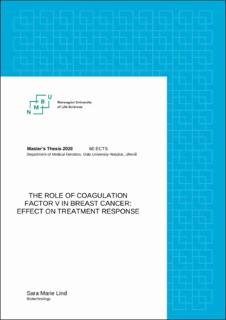| dc.contributor.advisor | Iversen, Nina | |
| dc.contributor.advisor | Carlsen, Harald | |
| dc.contributor.author | Lind, Sara Marie | |
| dc.date.accessioned | 2021-10-29T11:04:45Z | |
| dc.date.available | 2021-10-29T11:04:45Z | |
| dc.date.issued | 2021 | |
| dc.identifier.uri | https://hdl.handle.net/11250/2826527 | |
| dc.description.abstract | Sammenhengen mellom kreft og koagulasjon er vel etablert og det er kjent at kreftpasienter har en økt risiko for å utvikle trombose. Kreftceller kan ofte uttrykke koagulasjonsfaktorer som fører til ubalanse i hemostasen og som igjen kan føre til en protrombotisk tilstand. Det er oppdaget at koagulasjonsfaktor V (FV) uttrykkes i brystkrefttumorer, men hvilke mekanismer den har i kreftprogresjon er fremdeles ikke kjent. Ved å få en bedre forståelse av de molekylære mekanismene bak sammenhengen mellom kreft og koagulasjon kan en mer individuell behandling for både kreft og trombose i kreftpasienter bli mulig.
Målet for denne oppgaven var å få en bedre forståelse for mekanismene til FV i kreftprogresjon. Behandlingsrespons til neoadjuvant kjemoterapi i brystkreftpasienter ble studert gjennom analyser av kliniske datamaterialer. Effekten til kjemoterapi på koagulasjonsfaktor V mRNA (F5)-uttrykket, reguleringen av F5 og de funksjonelle effektene til FV ble studert in vitro i brystkreftcellelinjer.
Analysene av de kliniske datamaterialene avslørte en assosiasjon mellom økt F5-utrykk og behandlingsrespons til neoadjuvant kjemoterapi i to av pasientkohortene. I begge kohortene hadde pasientene blitt behandlet med kjemoterapi bestående av en kombinasjon av 5-fluorouracil, epirubicin og cyclophosphamide. I brystkreftcellelinjer førte separat behandling med 5-fluorouracil, epirubicin og doxorubicin til økt F5-uttrykk. Blant virkningsmekanismene til kjemoterapiene som ble assosiert med økt F5-uttrykk er induksjon av tumorprotein p53 (p53) aktivitet involvert. Rollen til p53 i reguleringen av F5 ble derfor studert. Både hemming av p53 og nedslåing av p53 genet resulterte i reduksjon av doxorubicin-indusert F5-utrykk. Mutasjoner i to mulige p53 bindingsseter i F5-promoteren i et luciferaseplasmid førte til en redusert luciferaseaktivitet i celler behandlet med doxorubicin. De funksjonelle effektene til FV på apoptose og proliferasjon ble studert i MDA-MB-231 celler. FV alene forårsaket økt apoptose og FV kombinert med aktivert protein C førte til redusert proliferasjon. Dette indikerte at FV hadde en antitumor effekt og at en av mekanismene bak kunne være gjennom hemming av vevsfaktor-mediert proteaseaktivert reseptor 2-aktivering. I tillegg forsterket FV effekten til doxorubicin ytterligere i brystkreftceller og kan da være involvert i effekten av økt F5-uttrykk på behandlingsrespons som ble funnet i de kliniske datamaterialene.
Resultatene indikerer en assosiasjon mellom FV og behandlingsrespons til neoadjuvant kjemoterapi, en induksjon av F5 ved behandling med flere typer kjemoterapi, en rolle for p53 i reguleringen av F5, en antitumor effekt for FV og støttet at effekten til FV kunne være gjennom det postulerte hemmingskomplekset for T vevsfaktor-mediert proteaseaktivert reseptor 2-aktivering. | en_US |
| dc.description.abstract | The link between cancer and coagulation is well established and it is documented that cancer patients have an increased risk for developing thrombosis. Cancer cells themselves often express coagulation factors, which causes imbalances in hemostasis resulting in a prothrombotic condition. Coagulation factor V (FV) is found to be expressed in breast cancer tumors, but the mechanisms of FV in cancer progression are not yet determined. By understanding the molecular mechanisms behind the link between cancer and coagulation, it may be possible to provide a more individualized treatment for both cancer and thrombosis in cancer patients.
The aim of this thesis was to gain a better understanding of the mechanisms of FV in the context of cancer progression. Treatment response to neoadjuvant chemotherapy in breast cancer patients was studied by analyses of clinical data materials. The effect of chemotherapy on coagulation factor V mRNA (F5) expression, the regulation of F5 and the functional effects of FV were studied in in vitro experiments in breast cancer cell lines.
Analyses of the clinical data material revealed an association between an elevated F5 expression and treatment response to neoadjuvant chemotherapy in two cohorts. In both cohorts the patients received a combination chemotherapy with 5-fluorouracil, epirubicin and cyclophosphamide. Separate treatment with 5-fluorouracil, epirubicin and doxorubicin resulted in an increased expression of F5 in breast cancer cell lines. The mechanism of action of the chemotherapies associated with increased expression of F5 is involved in induction of p53 activity. The role of p53 in the regulation of F5 was thus studied. Inhibition of p53 and knockdown of the coagulation factor V gene resulted in a reduction in doxorubicin induced F5 expression. Mutation of two putative p53 sites in the F5 promoter in a luciferase plasmid, resulted in a reduction in luciferase activity in cells treated with doxorubicin. The functional effects of FV were studied on apoptosis and proliferation in MDA-MB-231 cells. FV alone caused an increase in apoptosis and FV combined with activated protein C led to a decrease in proliferation. This indicated an antitumor effect of FV, and one mechanism involved may be the inhibition of tissue factor-induced protease activated receptor 2 activation. Moreover, FV facilitated the doxorubicin effect in breast cancer cells further which may also be involved in the treatment response in patients with elevated F5 expression documented in the clinical data materials.
The results indicated an association between FV and treatment response to neoadjuvant chemotherapy, an induction of F5 by several chemotherapies, a role of p53 in the regulation of F5, an antitumor effect of FV and supported the effect of FV through the postulated inhibition complex of tissue factor-induced protease activated receptor 2 activation. | en_US |
| dc.language.iso | eng | en_US |
| dc.publisher | Norwegian University of Life Sciences, Ås | en_US |
| dc.rights | Attribution-NonCommercial-NoDerivatives 4.0 Internasjonal | * |
| dc.rights.uri | http://creativecommons.org/licenses/by-nc-nd/4.0/deed.no | * |
| dc.title | The role of coagulation factor V in breast cancer : effect on treatment response | en_US |
| dc.type | Master thesis | en_US |
| dc.description.localcode | M-BIOTEK | en_US |

